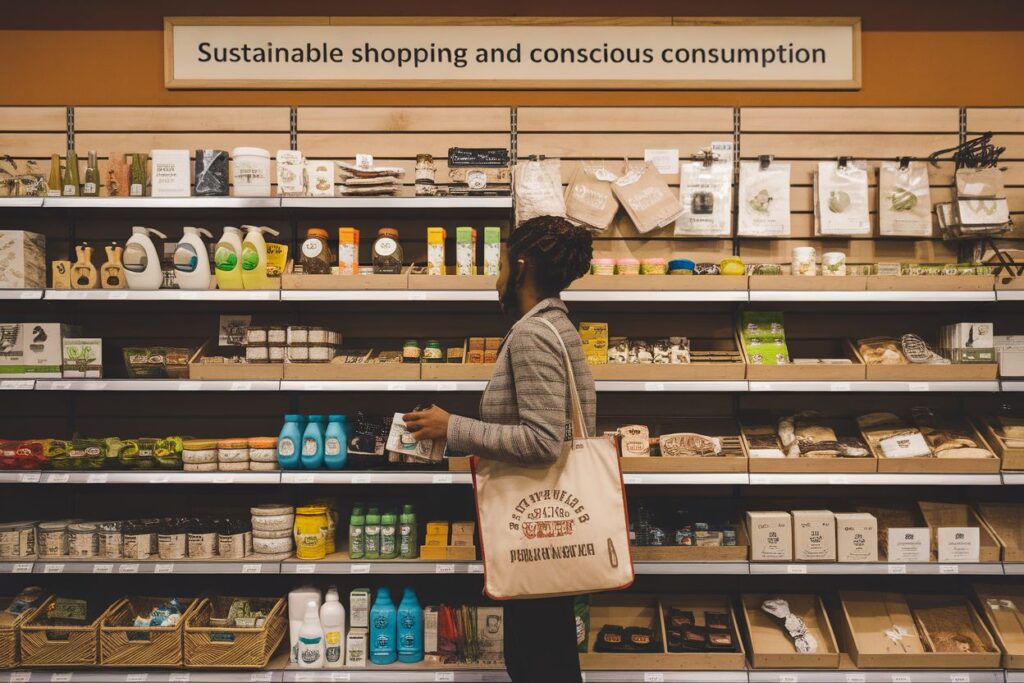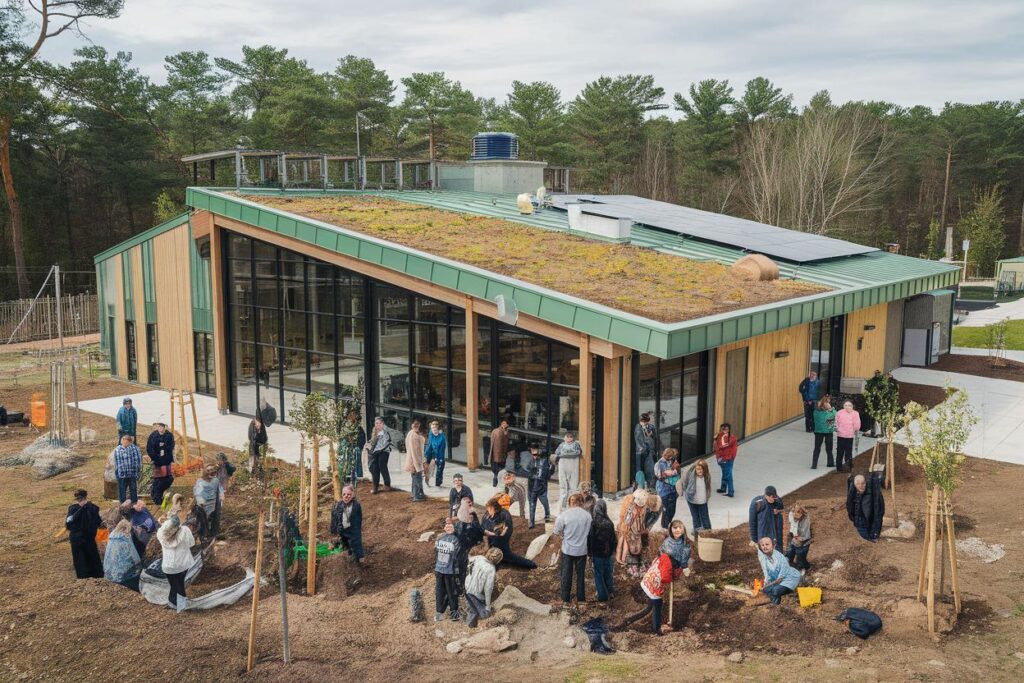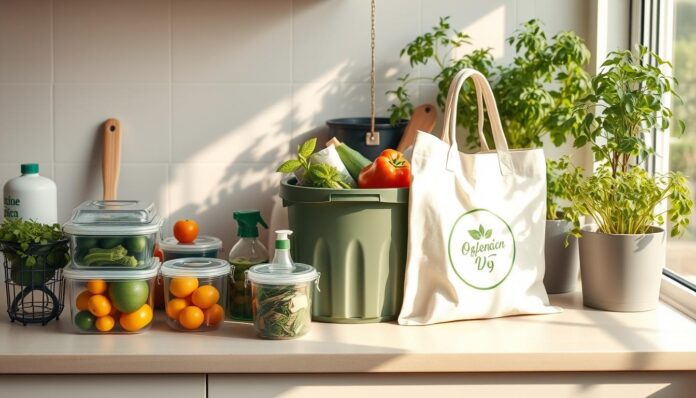Starting a zero waste journey might seem hard, but it’s doable with the right approach. This guide will show you five ways to live a zero waste lifestyle. You’ll learn about kitchen habits, sustainable shopping, and building a community. These steps help reduce waste and make the world a greener place.
These five steps will teach you to cut down on waste and save resources. They help you live an eco-friendly life that matches your values. Whether you’re new to zero waste or want to do more, this guide offers useful advice and strategies.
Understanding The Zero Waste Movement And Its Impact
The zero waste movement is growing fast, aiming to tackle big environmental issues. It wants to change how we make, use, and throw away things. This could lead to a more sustainable and circular world.
The zero waste idea started in the late 1970s. People then realized waste was harming the environment. They wanted a better way to manage resources. Now, it’s a big plan to stop waste, reuse, recycle, and save resources.
Zero waste living can greatly help the planet. It cuts down on waste and saves natural resources. This way, we can reduce pollution, protect nature, and save resources.
Zero waste living also saves money and creates jobs. It makes us use resources better and throw away less. This opens up new business chances and helps the economy grow.
Essential Zero Waste Kitchen Practices
Reducing waste in the kitchen is key to a zero waste lifestyle. Simple practices can greatly reduce your environmental impact and save money. Start by planning your meals to avoid food waste. Create a weekly menu and grocery list to buy only what you need.
Composting is another important step. It turns food scraps and organic waste into soil for your garden. Use a countertop compost bin or a backyard area to collect waste.
To cut down on packaging waste, use reusable containers. Glass jars, silicone bags, and cloth produce bags are good alternatives to plastics. Buying in bulk helps you refill containers and reduces packaging.
Adopting these zero waste kitchen practices can greatly reduce your household’s waste. It also makes a positive impact on the environment.
Sustainable Shopping And Conscious Consumption

Striving for a zero-waste lifestyle means changing how we shop. Embracing ethical consumerism and minimalism helps reduce our environmental impact. By choosing sustainable brands and making mindful purchases, we support the plastic-free movement.
Bulk shopping is a great way to cut down on waste. Stores now have bins for dry goods, spices, and personal care items. Using your own containers means you buy just what you need, saving money and reducing waste.
Using reusable containers is another key to sustainable shopping. From water bottles to storage containers, these items last longer than single-use plastics. They show your dedication to reducing waste and living zero-waste.
Exploring package-free stores is a step towards sustainable living. Look for local shops with bulk options and minimal packaging. Talking to vendors can teach you about their eco-friendly practices and help you find eco-friendly products.
Every choice we make as consumers can make a difference. By choosing sustainable options, we help create a greener future. This supports eco-friendly brands and initiatives.
Zero Waste Personal Care And Hygiene

Our personal care and hygiene routines can greatly affect the environment. By using natural products and DIY beauty, we can make a big difference. These changes help us live more sustainably.
Switching to natural products is a simple way to reduce waste. Try shampoo bars, bamboo toothbrushes, and refillable deodorants. These alternatives are better for the planet and often healthier for us.
If you enjoy making things, DIY beauty is a great choice. You can make face masks and lip balms at home. It’s fun, reduces waste, and lets you tailor your care to your needs.
“Sustainable self-care is not just about the environment – it’s about taking care of yourself in a way that aligns with your values and beliefs.”
Every small change we make can help a lot. By using natural and DIY products, we support a greener future. We also take better care of ourselves.
Minimizing Waste In Your Home Office
More people are working from home and want to be green. It’s key to cut down on waste in your office. There are smart ways to do this without losing productivity.
Using digital tools is a simple way to use less paper. Switch to cloud storage, e-signatures, and online meetings. This cuts down on printing and saves resources. It also makes your work flow better.
Choosing eco-friendly stationery is easy. Look for pens and notebooks made from recycled stuff. Also, pick refillable ink and reusable desk items. This helps reduce waste in your green workspace.
Using less energy is important for a green office. Turn off lights and gadgets when not needed. Buy energy-saving gear and think about solar power. These steps help the planet and save money.
Creating A Zero Waste Travel Routine
Starting a sustainable travel journey means being careful and reducing waste. By using eco-friendly items, you can lessen your impact on the environment. Pack reusable items like water bottles, shopping bags, and bamboo utensils to avoid plastic waste.
Choose hotels that care about the planet. Look for places that use energy and water wisely, manage waste well, and support local people. These choices help reduce your carbon footprint and make your trip greener.
Also, think about offsetting your travel emissions. Use carbon offset programs that fund projects to reduce greenhouse gases. This way, you can travel without harming the environment.
Adopting a zero waste travel plan lets you have amazing trips while protecting the planet. Begin with small steps, pack smart, and support green tourism. Together, we can make a big difference.
Building A Community Around Sustainable Living

Changing to a zero-waste lifestyle is a team effort. It needs community help and working together. Local projects, educational programs, and grassroots movements are key. They teach and push for a greener future in our communities.
In the United States, people are joining forces for zero-waste goals. Local groups, government, and non-profits are leading the way. They host events like waste challenges, recycling drives, and repair workshops.
These efforts unite people for a common goal. They encourage everyone to live more sustainably every day.
Learning about zero-waste living is crucial. Schools and local groups are teaching both kids and adults. They share how to live with less waste and its benefits for the planet.
These programs include workshops and hands-on activities. They help people understand and support the zero-waste movement. This way, they can spread the word to others.
Living sustainably is a team effort. It involves individuals, businesses, and local governments working together. Communities are starting projects like recycling and composting programs.
These projects bring different groups together. They help create effective waste management plans. This way, they make a bigger difference in the environment.
Final Thoughts
As we wrap up our look at the zero waste movement, it’s clear that living sustainably changes our lives and the planet. By choosing a zero waste lifestyle, we help create a better future. We also encourage positive change in our communities.
Throughout this article, we’ve talked about how to live zero waste. This includes setting up a zero waste kitchen and reducing waste at home and work. Even when we travel, we can make choices that help the planet.
Starting a zero waste journey might seem hard, but it’s worth it. Every small step we take can lead to big changes. Together, we can make a huge difference in reducing waste and protecting our environment.
So, let’s take that first step towards a zero waste future. Our actions matter, and living sustainably helps our world for years to come. Let’s work together to make a better planet for everyone.











